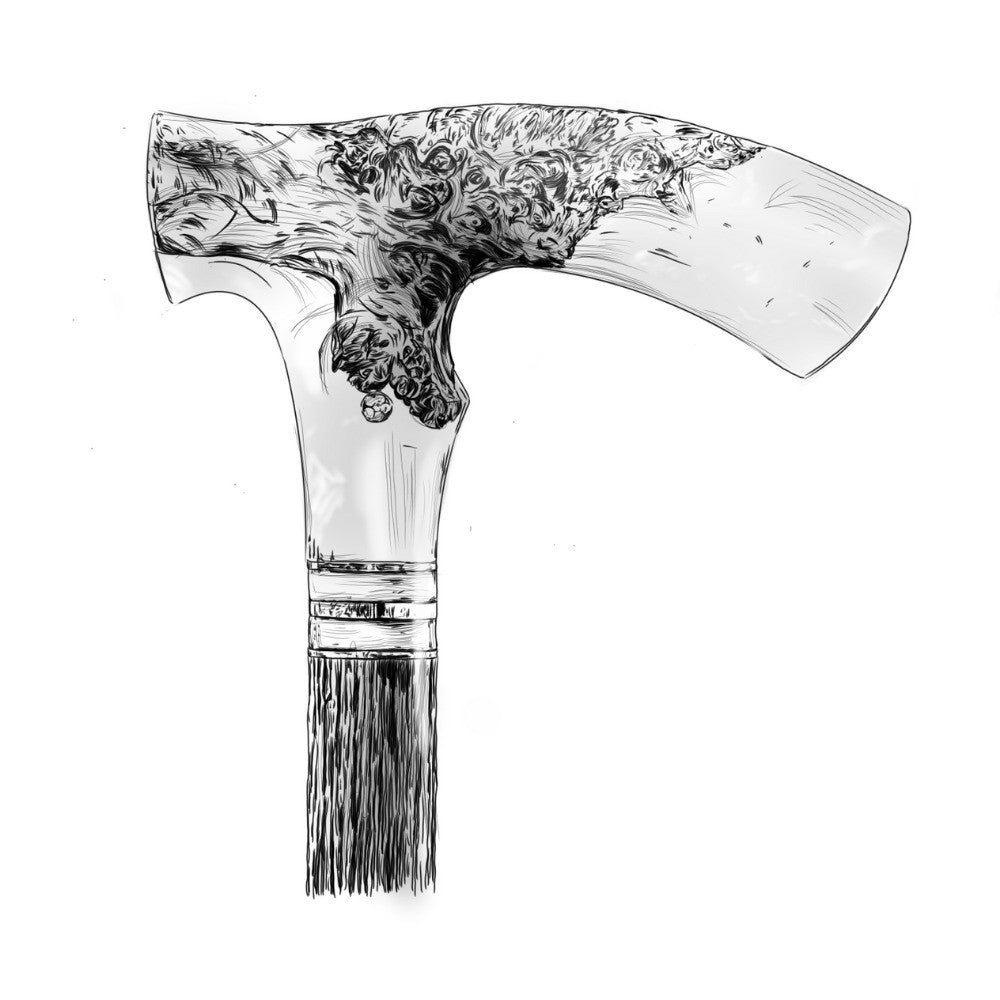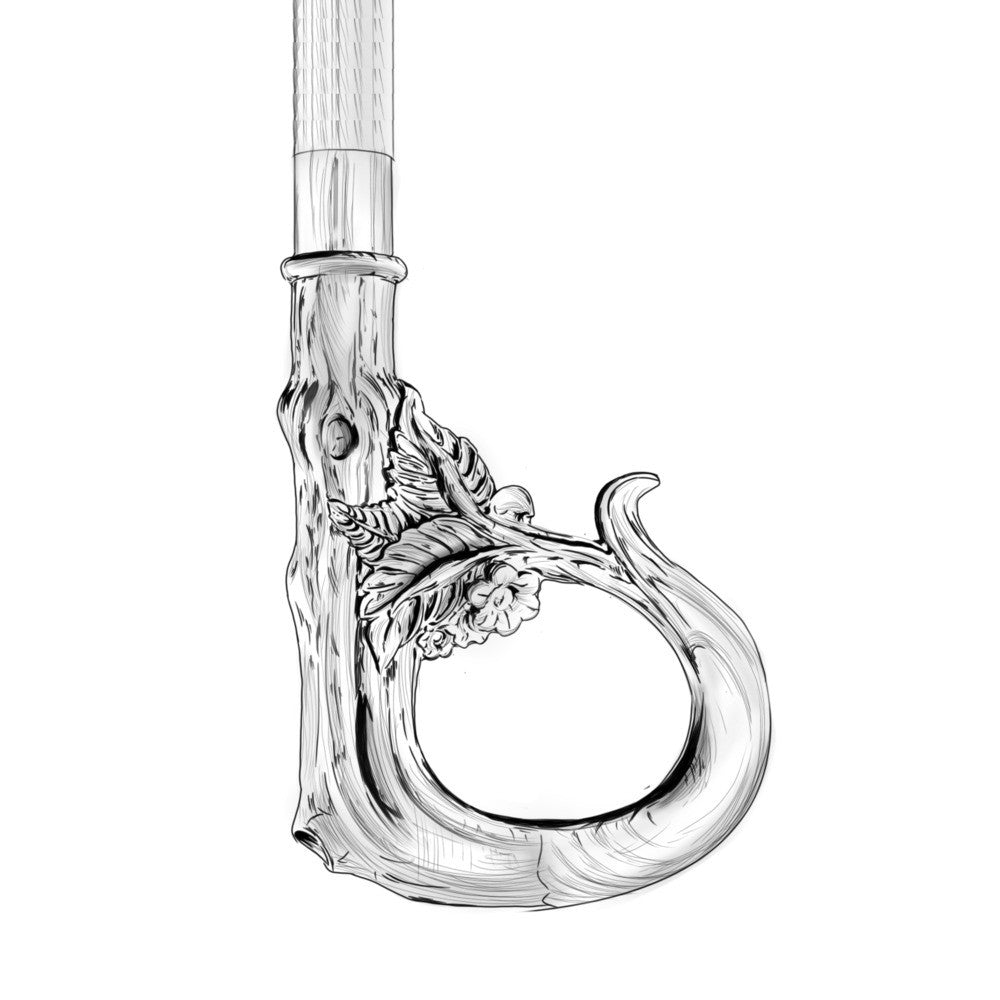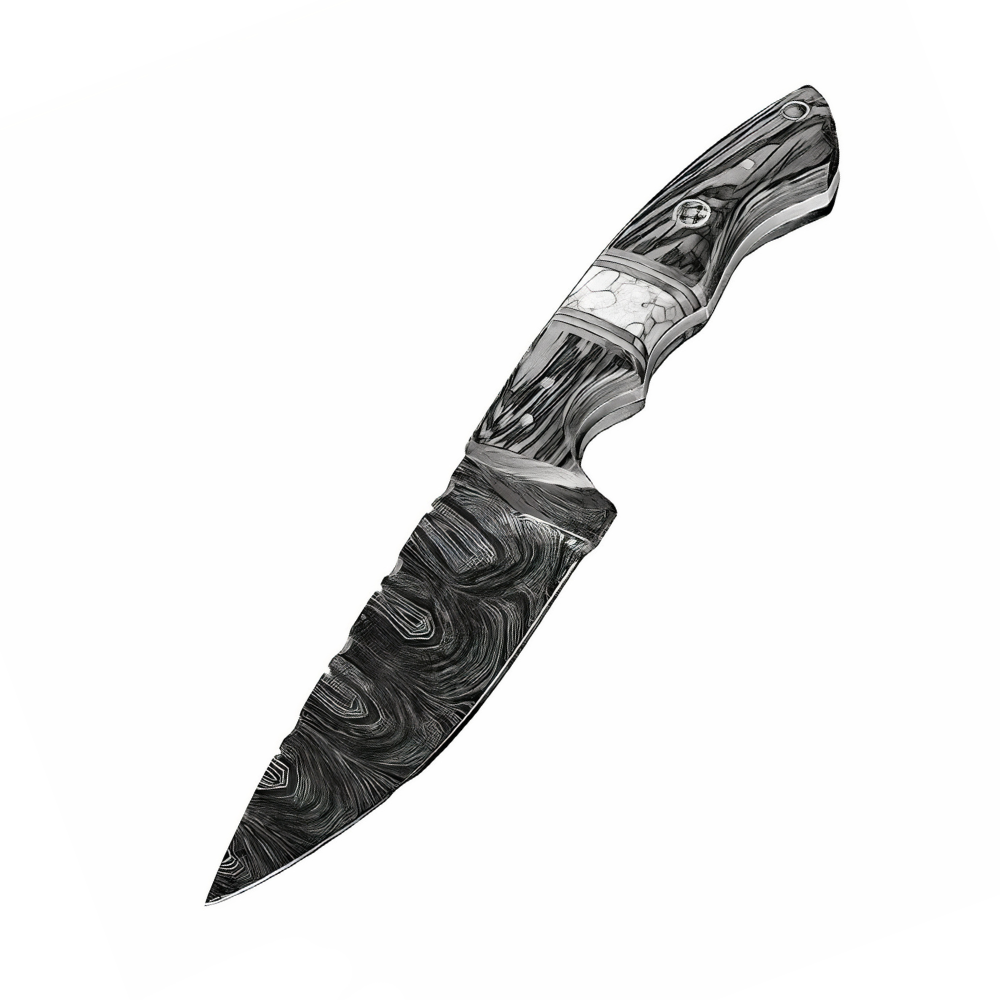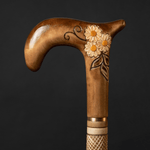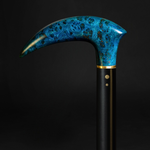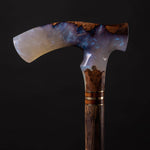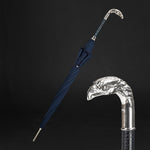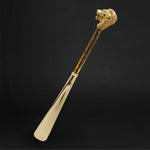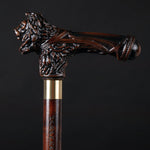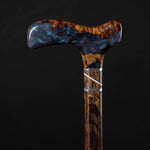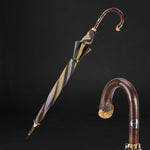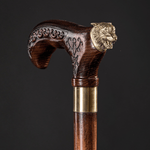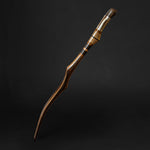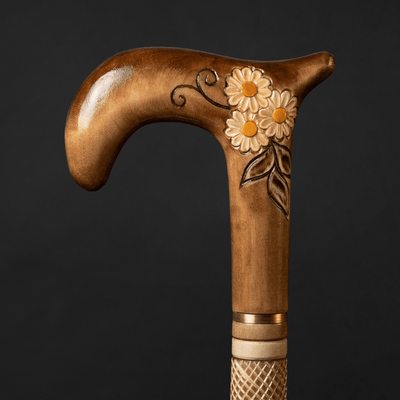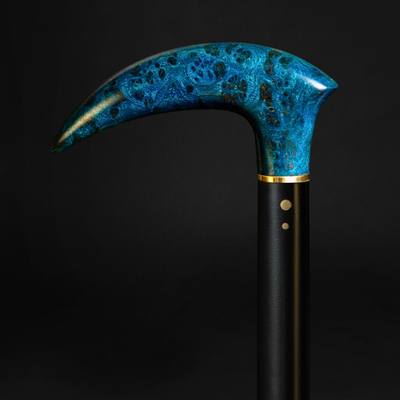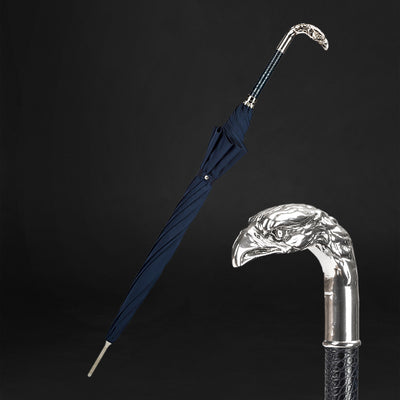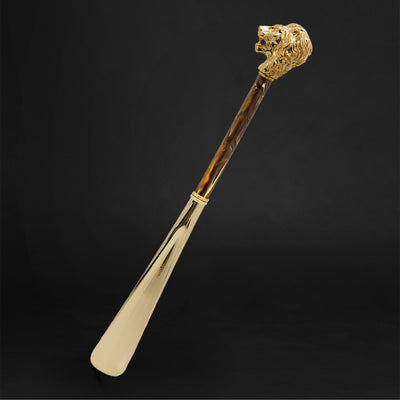You have no items in your shopping cart.
Recent Posts
-
The Art of Christmas Design: Walking Canes That Celebrate the Season in Style
-
How an Ergonomic Walking Cane Handle Prevents Hand and Wrist Strain?
-
How to Walk With a Cane Correctly to Avoid Back or Shoulder Strain?
-
5 Common Mistakes People Make When Buying a Walking Cane (and How to Avoid Them)
-
How to Choose a Walking Cane That Reflects Your Personality (Not Just Your Needs)?
-
Walking Canes That Match Formalwear for Weddings and Events
MOST POPULAR NOW
11
Sep
In the fast-paced world we live in today, staying active and independent is crucial for people of all ages. However, as we age, mobility can become a challenge due to various factors such as joint pain, muscle weakness, or injuries. This is where the humble yet remarkable walking cane steps in to provide much-needed balance and support.
The benefits of using wooden walking canes for balance and support
Understanding the need for balance
Balance is a fundamental aspect of human movement that often gets taken for granted until it becomes compromised. Maintaining balance is essential not only for avoiding falls but also for conserving energy and reducing the strain on our bodies. It's the foundation of mobility, and when it wavers, it can have profound effects on our daily lives.

The role of walking canes in balancing act
Walking canes have been used for centuries to assist individuals in maintaining their balance and mobility. These simple yet effective devices offer several benefits that contribute to a better quality of life.
1. Enhanced stability
One of the primary functions of a walking cane is to provide additional points of contact with the ground, effectively widening your base of support. This extra stability can make a world of difference, especially when navigating uneven terrain or recovering from an injury.
2. Reduced joint stress
Walking canes help distribute your body weight more evenly, which can alleviate stress on your joints, particularly the knees and hips. This reduced stress can significantly improve comfort and reduce the risk of exacerbating existing joint problems.
3. Improved posture
When used correctly, walking canes promote better posture. They encourage an upright stance, which not only enhances balance but also prevents the development of poor posture habits that can lead to chronic pain issues.
4. Increased independence
With the support of a walking cane, individuals can regain their confidence and independence. They are less reliant on others for assistance, allowing them to continue with their daily activities and enjoy an active lifestyle.
The purpose of this article
The purpose of this article is to shed light on the importance of balance and support in our daily lives and how walking canes play a pivotal role in achieving these goals. We aim to provide comprehensive information that not only educates but also empowers individuals to make informed choices regarding their mobility aids.
Choosing the right walking cane
Selecting the right walking cane is crucial to ensure it meets your specific needs. Here are some factors to consider:
1. Type of handle
Walking canes come with various handle designs, including T-shaped, offset, and ergonomic options. Choose one that feels comfortable in your hand and provides a secure grip.
2. Adjustability
Opt for a cane with adjustable height settings to accommodate your individual height and walking style. This ensures that you maintain proper posture while using it.
3. Material and weight
Consider the material of the cane. While aluminum canes are lightweight and durable, wooden canes offer a classic aesthetic. The weight of the cane should be manageable for your level of strength.
4. Additional features
Some walking canes come with extra features such as built-in LED lights, wrist straps, or folding capabilities. Evaluate these features based on your personal preferences and needs.
In conclusion, the importance of balance and support cannot be overstated when it comes to maintaining an active and independent lifestyle. Walking canes serve as invaluable tools in achieving these goals, offering enhanced stability, reduced joint stress, improved posture, and increased independence.
If you're considering investing in a walking cane, take the time to research and choose the one that best suits your requirements. With the right walking cane by your side, you can confidently stride towards a life filled with mobility, freedom, and comfort.
Historical perspective
Origins of wooden walking canes
The use of walking canes, specifically those crafted from wood, can be traced back through the annals of history. These seemingly simple aids have a rich and diverse history that spans cultures and epochs.
Ancient beginnings
The origins of wooden walking canes can be traced as far back as ancient civilizations. In Egypt, for example, evidence of canes has been found in the tombs of pharaohs, suggesting their use in both daily life and as symbols of power and prestige. In other parts of the world, such as China and Greece, canes were used for both practical and ceremonial purposes.
Medieval Europe
During the Middle Ages in Europe, wooden walking canes became more prevalent. They were often intricately carved and adorned with symbols, making them not only functional but also artistic expressions of status and identity. In this era, canes were frequently used as fashion accessories by the nobility.
Evolution in design
Over time, the design and craftsmanship of wooden walking canes have evolved significantly, reflecting changes in fashion, technology, and society's needs.
Functional adaptations
During the Renaissance period, walking canes began to feature more functional elements. Some canes were equipped with concealed weapons, such as swords or daggers, serving as tools of self-defense. Others incorporated built-in gadgets, like compasses or telescopes.
Ornate elegance
By the 18th century, canes took on a new level of ornate elegance. Ivory and precious metals were used for handles, often shaped into intricate figurines or animal forms. These canes became status symbols, denoting wealth and social standing.
The twentieth century
In the 20th century, wooden walking canes underwent a transformation as they became more standardized and practical. Materials like aluminum and synthetic plastics gained popularity due to their lightweight and durable properties. The focus shifted from ornate design to ergonomic handles and adjustable features for enhanced comfort and functionality.
Cultural significance
Wooden walking canes have held cultural significance across the globe, serving various purposes beyond their utilitarian function.
Symbol of authority
In many cultures, the walking cane has symbolized authority and leadership. Tribal chiefs, elders, and religious leaders often carried canes as a sign of their status and wisdom.
Ceremonial and religious use
Wooden walking canes have played important roles in religious ceremonies and rituals. In Christianity, bishops carry a staff, known as a crosier or crozier, symbolizing their pastoral role. Similarly, in Hinduism, Sadhus and Swamis may use canes during their spiritual journeys.
Fashion and style
Throughout history, canes have been integral to fashion and style. They have been used to make fashion statements, express personal tastes, and even provoke social commentary. The famous dandy, Beau Brummell, in the 19th century, was known for his extravagant canes, which became iconic in the world of men's fashion.
Wooden walking canes, with their deep-rooted history, diverse designs, and cultural significance, have left an indelible mark on human civilization. From their ancient origins to their evolution in design and their roles in society, these canes have not only provided physical support but also served as symbols of power, status, and personal expression. Today, as we appreciate the convenience and comfort they offer, it's important to remember the fascinating historical journey that these humble yet significant accessories have undertaken.
Types of wooden walking canes
Wooden walking canes come in a variety of styles and designs, each tailored to specific needs and preferences. In this section, we will explore three distinct types of wooden walking canes:
Classic single-point canes
Classic single-point canes are the quintessential image that comes to mind when one thinks of a walking cane. They are characterized by their timeless design, simplicity, and functionality.
1. Traditional elegance
Classic single-point canes often feature a single, straight shaft made from a sturdy wooden material such as oak, maple, or cherry. These canes exude an air of traditional elegance and sophistication.
2. Versatile usage
These canes are versatile and suitable for a wide range of users. Whether you need occasional support or rely on a cane regularly, a classic single-point cane offers stability and assistance while maintaining a timeless appearance.
3. Customization options
One of the appealing aspects of classic single-point canes is their potential for customization. Users can choose from various handle shapes and materials, including curved handles for ergonomic comfort or ornate handles for added style.
Quad canes for enhanced stability
Quad canes are designed with a unique base that sets them apart from classic single-point canes. This base consists of four prongs arranged in a rectangular or square configuration, offering enhanced stability and support.
1. Superior balance
The quad base of these canes provides a broader area of contact with the ground, making them exceptionally stable. This feature is especially beneficial for individuals who require additional support to prevent falls.
2. Ideal for uneven terrain
Quad canes excel on uneven or challenging surfaces, such as gravel paths or rugged terrain. They offer stability and confidence when navigating through various environments.
3. Adjustable heights
Many quad canes come with adjustable height settings, allowing users to customize the cane to their specific needs. This feature ensures proper posture and comfort while walking.
Stylish canes as fashion accessories
Wooden walking canes have not only served as functional aids but have also made their mark as stylish fashion accessories. These canes are designed to make a statement and express one's personal style.
1. Ornate handles
Stylish canes often feature ornate, decorative handles crafted from various materials such as ivory, metal, or acrylic. These handles can take on unique shapes and designs, making them eye-catching pieces of art.
2. Embellished shafts
The shafts of stylish canes are not overlooked in terms of design. They may be intricately carved, painted, or embellished with patterns and motifs that reflect the user's personality and taste.
3. Contemporary materials
In addition to traditional wood, stylish canes may incorporate modern materials like carbon fiber or acrylic for a contemporary twist. These materials offer durability and flexibility in design.
Wooden walking canes come in various forms to cater to the diverse needs and preferences of users. Whether you opt for the timeless elegance of a classic single-point cane, the enhanced stability of a quad cane, or the style statement of a fashionable cane, there is a wooden walking cane for everyone. These canes not only provide physical support but also serve as a means of self-expression and individuality.
Advantages of wooden walking canes
Wooden walking canes offer a range of advantages that make them a popular choice among individuals seeking both functional support and aesthetic appeal. In this section, we will explore the key benefits of using wooden walking canes:
Natural aesthetics
One of the standout advantages of wooden walking canes lies in their natural aesthetics. These canes exude timeless beauty and elegance.
1. Warm and inviting
Wooden canes possess a warm and inviting appearance, thanks to the natural grains and patterns in the wood. This organic charm can make users feel more connected to their cane, turning it into a personal accessory rather than just a medical device.
2. Versatile styles
Wooden walking canes come in various wood types, each with its unique color and grain pattern. This diversity allows users to choose a cane that aligns with their personal style, whether it's classic, rustic, or contemporary.
3. Complementary to wardrobe
Wooden canes effortlessly complement different outfits and occasions. They add a touch of sophistication to formal attire and blend seamlessly with casual wear, making them a versatile fashion accessory.
Durability and longevity
Wooden walking canes are renowned for their durability and longevity, making them a wise investment for those in need of reliable support.
1. Sturdy construction
Wooden canes are crafted from high-quality woods like oak, maple, or cherry, known for their strength and resilience. This ensures that the cane can withstand the rigors of daily use.
2. Resistant to wear and tear
Wooden canes are less prone to wear and tear compared to some other materials. They can maintain their integrity over the years, providing consistent support without deteriorating quickly.
3. Potential for refurbishment
In case of minor damage or surface wear, wooden canes can often be refurbished or repaired, prolonging their lifespan even further.
Customization options
Wooden walking canes offer extensive customization options, allowing users to tailor their cane to their specific needs and preferences.
1. Handle varieties
Users can choose from a wide range of handle styles, including ergonomic, T-shaped, or ornate designs. This customization ensures that the cane fits comfortably in the hand and aligns with individual preferences.
2. Height adjustability
Many wooden canes come with height-adjustable features, accommodating users of various heights and ensuring proper posture while walking.
3. Personalization
Wooden canes can be personalized with engravings, paint, or other decorative elements. This allows users to make their cane a unique expression of their personality.
Eco-friendly choice
For individuals concerned about the environment, wooden walking canes offer an eco-friendly choice compared to canes made from non-renewable materials.
1. Sustainable sourcing
Many wooden canes are made from sustainably sourced wood, ensuring that the production process minimizes environmental impact.
2. Biodegradability
Wooden canes are biodegradable, meaning that at the end of their lifespan, they naturally decompose without leaving a lasting environmental footprint.
3. Reduced carbon footprint
The production of wooden canes generally has a lower carbon footprint compared to the manufacturing of synthetic or non-renewable materials, making them a greener choice.
Wooden walking canes offer a compelling combination of natural aesthetics, durability, customization options, and eco-friendliness. Whether you prioritize the timeless beauty of wood, need a reliable and long-lasting support aid, or want to reduce your environmental impact, wooden walking canes stand as an excellent choice. Their versatility and charm make them not only functional but also a reflection of personal style and values.
The science behind wooden walking canes
Wooden walking canes are not just simple aids; they are backed by science and engineering principles that make them effective in providing support and stability. In this section, we will delve into the science behind wooden walking canes, focusing on the mechanics of balance, weight distribution, and their role in reducing stress on joints.
Mechanics of balance
Balance is a fundamental aspect of human mobility, and wooden walking canes play a crucial role in maintaining it.
1. Center of gravity
Human balance is heavily influenced by the center of gravity. When we stand or walk, our bodies balance around a point within our torso. Wooden walking canes help extend this base of support, effectively widening the area over which the center of gravity can be maintained.
2. Base of support
The base of support is the area beneath the body that comes into contact with the ground. By providing an additional point of contact, wooden canes increase the size of the base of support, making it easier for individuals to maintain their balance. This is especially beneficial when navigating uneven terrain or when dealing with conditions that affect stability.
3. Gait pattern
The use of a wooden cane can also influence one's gait pattern. People often adopt a more stable and deliberate walking style when using a cane. This adjusted gait can improve balance and reduce the risk of falls.
Weight distribution
Wooden walking canes play a pivotal role in weight distribution during walking.
1. Equal weight distribution
When using a cane, individuals can distribute their body weight more evenly between their legs. This reduces the strain on any single limb, which can be especially beneficial for those with joint issues or injuries.
2. Reduced load on joints
By redistributing body weight, wooden canes help alleviate the load on joints, particularly the knees and hips. This can significantly reduce the risk of joint pain and injury, making walking a more comfortable and sustainable activity.
3. Improved posture
The use of a wooden cane often encourages individuals to adopt a more upright and balanced posture. This proper alignment not only aids in distributing weight evenly but also prevents the development of poor posture habits that can lead to long-term musculoskeletal issues.
Reduction of stress on joints
One of the primary benefits of wooden walking canes is their ability to reduce stress on joints.
1. Shock absorption
Wooden canes, especially those with rubberized tips, provide a degree of shock absorption when they come into contact with the ground. This minimizes the impact and stress transmitted to the joints with each step.
2. Stabilization
Wooden canes stabilize the body during movement. They act as a buffer, absorbing some of the force generated when walking and preventing it from reaching the joints, thus reducing stress and potential damage.
3. Improved joint health
By reducing the stress and impact on joints, wooden canes can contribute to improved joint health over time. This is particularly important for individuals with conditions like arthritis or those recovering from joint surgeries.
The science behind wooden walking canes is firmly rooted in principles of balance, weight distribution, and stress reduction on joints. Understanding how these canes work at a mechanical level highlights their importance as aids in maintaining mobility, stability, and joint health. Whether used for occasional support or as a daily necessity, wooden walking canes have a scientific foundation that makes them indispensable for individuals seeking to enhance their quality of life.

Health benefits
Wooden walking canes offer a myriad of health benefits that extend beyond mere support. In this section, we will explore the various ways in which wooden walking canes contribute to improved health and well-being.
Improved posture
Improved posture is one of the significant health benefits associated with using wooden walking canes.
1. Spinal alignment
Wooden walking canes encourage users to maintain an upright and balanced posture. The act of holding a cane naturally aligns the spine, reducing the risk of developing poor posture habits.
2. Reduced strain
Proper posture minimizes strain on the back, neck, and shoulders. By distributing the weight evenly and supporting an erect stance, wooden canes help alleviate tension in these areas.
3. Long-term benefits
Consistently using a wooden cane with good posture can have long-term benefits, including a decreased likelihood of developing chronic back pain or musculoskeletal issues associated with poor posture.
Enhanced mobility
Enhanced mobility is a primary reason individuals turn to wooden walking canes.
1. Increased independence
Wooden canes provide the support necessary for individuals to move independently. They enable users to navigate their surroundings with greater confidence and freedom.
2. Expanded range
With the assistance of a cane, individuals can expand their range of movement, whether it's walking around the house, going shopping, or exploring outdoor spaces. This increased mobility can contribute to a more active and engaged lifestyle.
3. Maintenance of muscle strength
Using a wooden cane allows individuals to engage their leg muscles in a controlled and supported manner. This can help maintain muscle strength, preventing muscle atrophy due to inactivity.
Pain relief
Wooden walking canes are often sought for their pain relief benefits.
1. Reduced joint pain
The support provided by wooden canes reduces the stress on joints, particularly the knees and hips. This reduction in joint strain can alleviate pain associated with arthritis, osteoarthritis, or joint injuries.
2. Back pain management
Wooden canes assist in maintaining an upright posture, which can significantly reduce lower back pain. Individuals with chronic back issues may find relief by using a cane as it eases the pressure on the spine.
3. Improved comfort
The redistribution of body weight with the help of a wooden cane can lead to increased comfort while walking. This can be particularly beneficial for those who experience discomfort or pain during movement.
Prevention of falls
Fall prevention is a critical health benefit associated with wooden walking canes.
1. Enhanced stability
Wooden canes provide an extra point of contact with the ground, effectively widening the base of support. This added stability reduces the risk of losing balance and falling, especially on uneven or slippery surfaces.
2. Confidence boost
Knowing they have a reliable support system in the form of a wooden cane, individuals often experience increased confidence in their ability to move safely. This psychological boost can help reduce anxiety related to falls.
3. Injury avoidance
By preventing falls, wooden canes play a vital role in injury avoidance. Falls can lead to fractures, sprains, and other injuries, all of which can be mitigated through the use of a cane.
Wooden walking canes offer a holistic approach to health and well-being. They improve posture, enhance mobility, provide pain relief, and, most importantly, prevent falls. Whether used as a temporary aid or a long-term companion, wooden walking canes contribute significantly to the overall health and quality of life of individuals seeking support and stability.
Who can benefit from wooden walking canes?
Wooden walking canes are versatile aids that offer a range of benefits, making them invaluable to various groups of people. Here, we explore who can benefit from the use of wooden walking canes:
Seniors
Seniors are one of the primary demographics that can greatly benefit from wooden walking canes.
1. Balance support
As individuals age, their sense of balance may diminish, increasing the risk of falls. Wooden canes provide essential support for seniors, helping them maintain balance and stability while walking.
2. Increased independence
Seniors often seek to maintain their independence and mobility. Wooden walking canes allow them to move about with confidence, reducing their reliance on others for support.
3. Pain management
Seniors frequently contend with joint pain and conditions such as arthritis. Wooden canes can alleviate joint stress, making walking more comfortable and less painful.
Individuals with mobility issues
Individuals with mobility issues encompass a broad spectrum of people who may benefit from wooden walking canes.
1. Chronic conditions
Those living with chronic conditions like multiple sclerosis, Parkinson's disease, or muscular dystrophy can experience improved mobility and stability through the use of wooden canes.
2. Recovery from injuries
People recovering from injuries, such as sprains, strains, or fractures, often require temporary assistance to regain mobility. Wooden canes provide the necessary support during the recovery process.
3. Neurological disorders
Conditions affecting the nervous system can lead to balance and coordination challenges. Wooden canes offer crucial aid in navigating daily life for individuals with conditions like stroke or cerebral palsy.
Post-surgery patients
Post-surgery patients frequently rely on wooden walking canes during their recovery period.
1. Orthopedic procedures
Patients recovering from orthopedic surgeries, such as hip or knee replacements, can use wooden canes to reduce strain on the surgical site and facilitate a smoother recovery.
2. Cardiac surgery
Following cardiac surgeries or procedures, individuals may experience reduced stamina and mobility. Wooden canes assist in regaining strength and confidence in walking.
3. Abdominal surgeries
Patients recovering from abdominal surgeries often face challenges in movement due to incisions and muscle weakness. Wooden canes offer support while reducing the risk of postoperative complications.
Wooden walking canes are versatile aids that cater to the needs of a diverse range of individuals. Whether it's seniors looking to maintain their independence, those with mobility issues seeking support in daily activities, or post-surgery patients on the road to recovery, wooden canes play a crucial role in enhancing mobility, stability, and overall quality of life. Their adaptability and effectiveness make them a valuable tool for anyone in need of additional support and balance.
Choosing the right wooden walking cane
Selecting the right wooden walking cane is essential to ensure it provides the support and comfort you need. Here are crucial factors to consider when choosing the perfect wooden walking cane:
Proper sizing
Proper sizing is fundamental to the functionality and comfort of your wooden walking cane.
1. Height adjustment
Look for a cane that allows for height adjustment. The cane should be set to a height that allows your arm to bend at a comfortable angle (usually around 30 degrees) when you grip the handle. This ensures proper weight distribution and support.
2. Custom fit
Some canes are available in various sizes or with customizable height settings. Consider your individual height and walking style to find the right fit for you.
3. Weight-bearing capacity
Ensure that the cane you choose can support your weight adequately. Different canes have varying weight limits, so select one that matches your needs.
Handle options
The handle of a wooden walking cane significantly impacts comfort and usability.
1. Handle shapes
Wooden canes come with various handle shapes, including T-shaped, offset, derby, and ergonomic designs. Test different handle types to find the one that feels most comfortable and provides a secure grip.
2. Materials
Consider the material of the handle. Wooden handles are classic and aesthetically pleasing, while rubber or foam handles may provide a more cushioned and ergonomic grip. Choose the material that suits your preferences and needs.
3. Wrist straps
Some handles come with attached wrist straps. These straps can prevent accidental drops and allow you to free up your hand when needed, such as when opening doors.
Tip selection
The tip of your wooden walking cane plays a vital role in stability and safety.
1. Standard rubber tips
Most canes come with standard rubber tips that provide good traction on various surfaces. Ensure the tip is in good condition, as worn tips can compromise stability.
2. Specialized tips
Consider specialized tips if you have specific needs. For example, there are ice tips for slippery conditions, tripod tips for increased stability, and pivoting tips that allow for a more natural gait.
3. Regular inspection
Regularly inspect the tip of your cane for wear and tear, and replace it as needed to maintain optimal support and safety.
Consideration of aesthetics
While functionality is paramount, the aesthetics of your wooden walking cane can also be a consideration.
1. Wood type
Wooden canes are available in various wood types, each with its unique grain and color. Choose a wood type that appeals to your sense of style and aesthetics.
2. Ornate or minimalist
Consider whether you prefer an ornate or minimalist design. Some canes feature intricate carvings, while others maintain a simple, classic look.
3. Personalization
If aesthetics are important to you, look for canes that offer personalization options. You may be able to add engravings or decorative elements to make your cane a unique expression of your personality.
Choosing the right wooden walking cane involves a combination of practical considerations and personal preferences. Proper sizing, comfortable handle options, suitable tip selection, and aesthetics that resonate with you all play a role in finding the ideal cane. By carefully evaluating these factors, you can ensure that your wooden walking cane provides the support you need while reflecting your individual style and needs.
Proper usage and maintenance
To maximize the benefits and lifespan of your wooden walking cane, it's essential to understand proper usage and maintenance. Here's a comprehensive guide to help you make the most of your cane:
Walking techniques
Using your wooden walking cane correctly ensures both safety and effectiveness.
1. Weight distribution
Distribute your weight evenly between the cane and your opposite leg. As you take a step, place the cane forward and lean on it slightly for support.
2. Opposite side movement
When walking, move the cane and the opposite leg together. For example, if you're using the cane with your right hand, step forward with your left leg simultaneously.
3. Avoid overreliance
While the cane provides support, strive to maintain a natural gait. Avoid leaning too heavily on the cane, as this can lead to poor posture and reduced muscle engagement.
4. Ascending and descending stairs
When climbing stairs, lead with your stronger leg and follow with the cane. When descending, start with the cane and then step down with your weaker leg.
Care and cleaning
Proper care and cleaning can extend the life of your wooden walking cane.
1. Regular inspection
Inspect your cane regularly for signs of wear and damage. Check the handle, shaft, and tip for any issues that may compromise its integrity.
2. Cleaning
Clean your cane regularly with a damp cloth to remove dirt and debris. Be sure to dry it thoroughly to prevent moisture from damaging the wood.
3. Handle care
If your cane has a wooden handle, consider applying a light coat of wood polish or wax to maintain its luster and prevent drying or cracking.
4. Tip replacement
Replace the rubber tip when it shows signs of wear. A worn tip can reduce traction and stability.
Storage tips
Proper storage helps protect your wooden walking cane when it's not in use.
1. Dry storage
Store your cane in a dry area to prevent moisture damage. Avoid leaving it in humid or damp environments.
2. Upright position
Store your cane in an upright position, leaning against a wall or in a dedicated cane stand. Avoid leaving it lying on the ground or against furniture, as this can lead to warping or damage.
3. Transportation
If you need to transport your cane, consider using a cane bag or cover to protect it from scratches or damage during travel.
4. Maintenance tools
Keep any tools needed for maintenance, such as replacement tips or cleaning supplies, readily available so that you can address any issues promptly.
Proper usage and maintenance of your wooden walking cane are essential for ensuring its functionality, safety, and longevity. By following the recommended walking techniques, regularly inspecting and cleaning your cane, and storing it correctly, you can enjoy the benefits of enhanced mobility and support while preserving the quality and appearance of your cane for years to come.
Conclusion
In conclusion, wooden walking canes offer a multitude of benefits that extend far beyond mere support. From improved posture and enhanced mobility to pain relief and fall prevention, these versatile aids have a significant positive impact on the lives of those who use them.
Recap of benefits:
-
Improved posture: Wooden walking canes help maintain an upright posture, reducing strain on the back and shoulders.
-
Enhanced mobility: They provide the necessary support for individuals to move independently, expanding their range of movement.
-
Pain relief: Wooden canes reduce joint pain and discomfort, making walking more comfortable and less painful.
-
Prevention of falls: By offering stability and balance, they play a crucial role in preventing falls and associated injuries.
Whether you are a senior looking to maintain your independence, an individual with mobility issues seeking support, or a post-surgery patient on the path to recovery, wooden walking canes are invaluable companions on your journey to improved mobility and quality of life.
Encouragement for consideration:
If you or someone you know could benefit from the advantages of wooden walking canes, take the time to explore the options available. Consider factors such as proper sizing, handle preferences, tip selection, and even the aesthetics that resonate with your style. By choosing the right wooden walking cane and using it correctly, you can experience the freedom, comfort, and support that these aids provide.
Remember that wooden walking canes are not just functional tools; they are companions in your daily life, offering a helping hand and a touch of elegance. Embrace the benefits they bring, and step confidently into a world of improved mobility, posture, and well-being.
FAQs
Here are answers to some commonly asked questions about wooden walking canes:
A. Are wooden walking canes suitable for all ages?
Yes, wooden walking canes are suitable for individuals of various ages. While they are often associated with seniors, they can provide support and stability to anyone who requires assistance with balance, mobility, or pain relief. People of all ages, from young adults to seniors, can benefit from the use of wooden walking canes, depending on their specific needs and circumstances.
B. Can using a cane worsen my condition?
Using a cane correctly, with proper guidance, should not worsen your condition. In fact, using a cane can often alleviate strain and discomfort by providing additional support and balance. It's essential to choose the right cane for your needs and ensure that it is properly sized and used with the recommended techniques. If you have concerns about using a cane due to an existing medical condition, consult with a healthcare professional or physical therapist for personalized guidance.
C. How can I choose the right cane for my needs?
Choosing the right wooden walking cane involves considering several factors:
-
Proper sizing: Ensure that the cane's height is adjusted to your individual needs, allowing for a comfortable and natural posture.
-
Handle options: Select a handle style that suits your grip and provides comfort. Options include T-shaped, offset, derby, and ergonomic handles.
-
Tip selection: Choose the appropriate tip for your intended use and terrain. Rubber tips are standard, but specialized tips are available for different conditions.
-
Aesthetics: Consider the wood type and design that aligns with your personal style and preferences.
-
Consultation: If you have specific medical or mobility needs, consult with a healthcare professional or physical therapist for personalized recommendations.
D. Are there any maintenance tips for wooden walking canes?
Yes, proper maintenance can extend the life of your wooden walking cane:
-
Regular inspection: Check for wear and damage regularly, including the handle, shaft, and tip.
-
Cleaning: Clean your cane with a damp cloth to remove dirt and debris, and be sure to dry it thoroughly to prevent moisture damage.
-
Handle care: If your cane has a wooden handle, consider applying wood polish or wax to maintain its appearance and prevent drying or cracking.
-
Tip replacement: Replace the rubber tip when it shows signs of wear to maintain traction and stability.
E. What should I do if I encounter resistance or stigma when using a cane?
If you encounter resistance or stigma when using a cane, it's essential to prioritize your well-being and mobility:
-
Educate others: Share information about the benefits of using a cane and why you use it. Educating others can dispel misconceptions and reduce stigma.
-
Confidence: Walk with confidence, and focus on the positive impact the cane has on your life. Your attitude can influence how others perceive your use of the cane.
-
Seek support: Connect with support groups or communities of individuals who use canes or mobility aids. They can offer guidance and share experiences on how to handle societal perceptions.
-
Professional help: If you face significant emotional or psychological challenges due to stigma, consider seeking support from a mental health professional to help you cope and build confidence in using your cane.
Remember that using a cane is a personal choice made for your health and well-being. Don't let societal perceptions deter you from experiencing the benefits it can provide.
Also Purchased
-
Beige Walking Cane for Ladies Chamomile Flower, Wooden Walking Stick
Introducing our beautiful Beige Walking Cane for Ladies with Chamomile Flower, a Wooden Walking Stick that is hand carved and handmade, making it both pretty and unique. This walking cane...$90.00$79.50 -
Exotic Burl Wood Walking Cane – Fashionable Artisan Stick
A sculptural statement in deep, oceanic blue — this walking cane is more than a support accessory, it's wearable art. Meticulously hand-shaped from stabilized burl wood, the handle evokes the...$425.00 -
ArtWalkingSticks™ MAGIC Walking Cane, Handmade - Make to Order
This piece of art is created for those who value details. We make one of a kind, handcrafted wood and resin canes. Our Wooden Canes are completely unmatched in creativity....$430.00 -
Umbrella with Eagle Handle, Fashion Umbrella For Men
Make a bold and fashionable statement with our Umbrella with Eagle Handle - a unique and functional accessory designed for men. The striking eagle handle is the highlight of this...$325.00 -
Fashionable Lion Shoehorn Long Handle, Pearly Brown Shaft, Handmade
Introducing our Fashionable Lion Shoehorn, a handcrafted, long-handled shoe horn with a pearly brown shaft that's both stylish and practical. The intricate Lion design adds a touch of elegance to...$240.00 -
ArtWalkingSticks™ MAGIC Red Walking Cane - Unisex, Handmade
This piece of art is created for those who value details. We make one of a kind, handcrafted wood and resin canes. Our Wooden Canes are completely unmatched in creativity....$425.00
